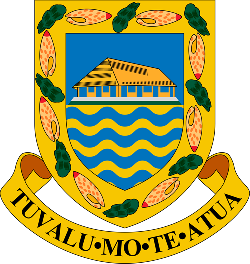Areas of Expertise
Project Status
Project Type
Results
Institutional strengthening of Tuvalu's NDA and Preparation of Country Programme - The Tuvalu Readiness-1 project will highly support mechanisms on strengthening the NDA’s capacity and building on that capacity to deliver concise and effective measures in addressing climate finance, enhancing engagement with GCF, building on national stakeholders and private sectors, women and vulnerable groups communication whilst engaging them in decision making and voicing their opinions to build a reflective Country Programme and strategic framework.
ObjectivesThe project will supoort
(i) strengthening the institutional capacity of the NDA to fulfil its role and obligations to the Green Climate Fund (‘the Fund’) and
(ii) formulating a country programme to further enhance Tuvalu’s strategic engagement with the Fund.
For the first component, the NDA will work closely with the delivery partner and national stakeholders to put in place new or improved mechanisms, procedures and processes for accessing, managing and monitoring climate finance. For the second component, the NDA will engage government, civil society organisations, private sector and island communities to develop a strategic framework of climate change investments that are appropriate, transformative, and scalable, and are aligned with Tuvalu’s national sustainable development and climate change priorities
(i) strengthening the institutional capacity of the NDA to fulfil its role and obligations to the Green Climate Fund (‘the Fund’) and
(ii) formulating a country programme to further enhance Tuvalu’s strategic engagement with the Fund.
For the first component, the NDA will work closely with the delivery partner and national stakeholders to put in place new or improved mechanisms, procedures and processes for accessing, managing and monitoring climate finance. For the second component, the NDA will engage government, civil society organisations, private sector and island communities to develop a strategic framework of climate change investments that are appropriate, transformative, and scalable, and are aligned with Tuvalu’s national sustainable development and climate change priorities
Status: Current
Project Coordinator: Alamoana TofuolaFinance Assistance: Betty FousagaThe Managing Water Scarcity through Strengthened Water Resources Management project respondsto MFAT’s Water Security Strategic Approach to address the climate change-related water securitychallenges faced by Pacific Island Countries. The Project is being implemented by the PacificCommunity (SPC) over the three-year period from July 2020 to June 2023, and.builds upon the achievements, learnings, and enabling environments established through the MFAT-funded Strengthening Water Security of Vulnerable Island States (SWSVIS) project. This Projectwas also implemented by SPC and from 2015 to 2019 supported a range of activities to strengthenthe availability, reliability and quality of drinking water in vulnerable and isolated communities inthe Cook Islands, Kiribati, the Marshall Islands, Tokelau and Tuvalu. The SWSVIS project workedacross multiple sectors within the participating countries to help develop and implement a suite ofpractical measures and tools that strengthened local capacity to anticipate, prepare for and respondto the impacts of drought. The new Water Scarcity Project represents a significant scaling up andrefocusing of the activities implemented under the SWSVIS project. It aims to provide support tospecific water-scarce communities to actively manage resources to improve resilience, in order that:• Communities have the infrastructure and capability required to access, collect and store water.• Communities understand, protect and maintain water resources and infrastructure; and• Communities are sustainably using water resources and managing risk.Implementation of the Project is now commencing in each of the five atoll nations of the Cook Is-lands, Kiribati, the Marshall Islands, Tokelau and Tuvalu.
Status: Current
Project Coordinator: Mr Lono LeneuotiSIDS rely on small coastal aquifers for their water supply needs. These coastal aquifers are fragile thin freshwater lenses that float on the underlying denser seawater and are reliant on rainfall for recharge. These coastal aquifers are at higher risk of impact to water quality deterioration from threats including saltwater contamination from sea level rise, over abstraction, wave overtopping, loss of aquifer area through coastal erosion, and other impacts on water quality from inappropriate land-use activities. Climate change exacerbates these long-running threats to coastal aquifers through increased climate variability and climate extremes. The fragility of coastal fresh groundwater systems necessitates careful management and protection to ensure their long-term integrity and their role in climate change adaptation strategies and improved water security. The project aims at improving the understanding, use, management and protection of coastal aquifers towards enhanced water security, including in the context of a changing climate. More specifically it aims at 1) identifying the extent, threats and the development potential of groundwater resources, 2) increasing awareness of groundwater as a water security supply source, 3) providing options for improved access to groundwater and 4) and improving aquifer protection and management, within Pacific Small Island Developing States.
Status: Current
The Tuvalu Integrated Water Resource Management Project focuses on the atolls of Funafui, Niutao, Nanumea and Nanumaga working on developing drought management plans, creating water and sanitation plan, and collecting data and producing a toll to enable accurate forecasting of water shortages and drought information.
Status: Current
The overall goal of the Programme is to increase the resilience of populations in the CookIslands, Niue, Palau, the Republic of the Marshall Islands (RMI) and Tuvalu to climate changeand climate-related hazards, through the delivery of timely, accurate and actionable climate andocean information and early warnings to facilitate climate-resilient policy, planning,preparedness and response actions.The Programme will establish integrated climate and ocean information services and multihazardearly warning systems (MHEWS) in five Pacific Small Island Developing States (SIDS):Cook Islands, Niue, Palau, RMI and Tuvalu.
Status: Current
topography, size, geographical remoteness and access to resources. Despite these challenges, it has become a leading voice for enhanced climate mitigation regionally and globally. Tuvalu is now developing a national adaptation planning process (and NAP) that will form a sustainable platform for future adaptation investments.
Status: Current
